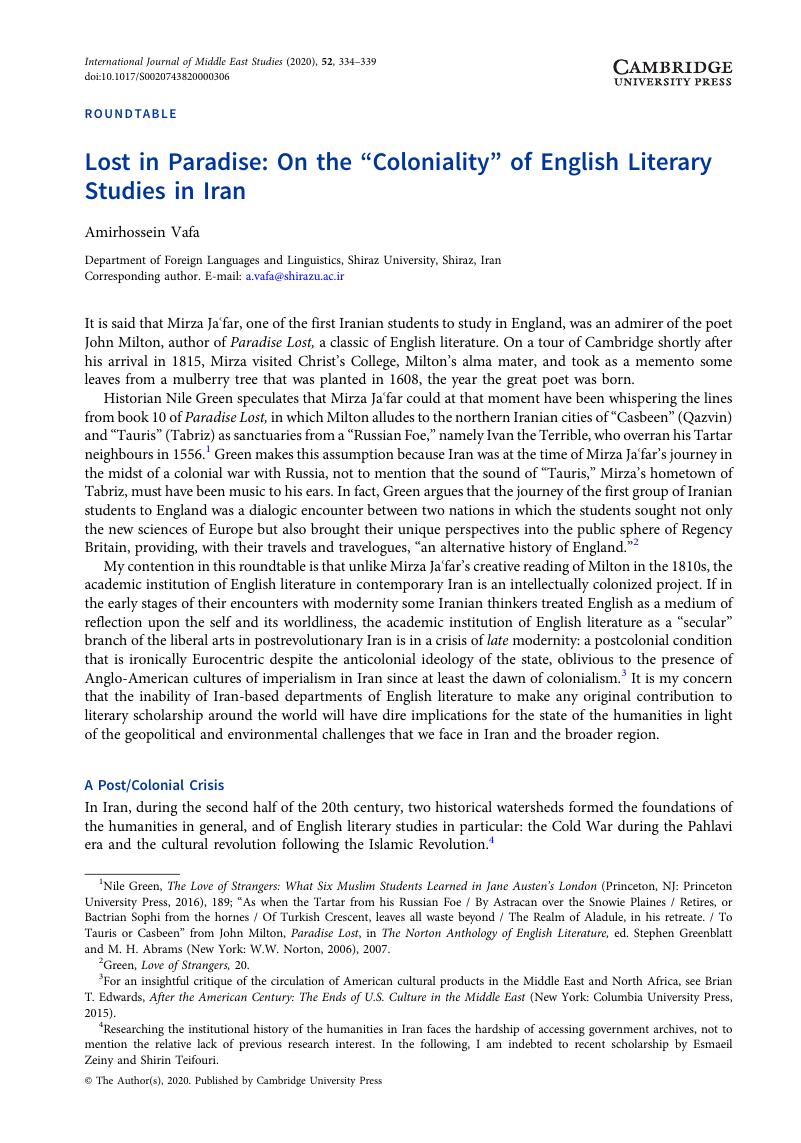Published online by Cambridge University Press: 28 May 2020

1 Green, Nile, The Love of Strangers: What Six Muslim Students Learned in Jane Austen's London (Princeton, NJ: Princeton University Press, 2016), 189CrossRefGoogle Scholar; “As when the Tartar from his Russian Foe / By Astracan over the Snowie Plaines / Retires, or Bactrian Sophi from the hornes / Of Turkish Crescent, leaves all waste beyond / The Realm of Aladule, in his retreate. / To Tauris or Casbeen” from John Milton, Paradise Lost, in The Norton Anthology of English Literature, ed. Stephen Greenblatt and M. H. Abrams (New York: W.W. Norton, 2006), 2007.
2 Green, Love of Strangers, 20.
3 For an insightful critique of the circulation of American cultural products in the Middle East and North Africa, see Edwards, Brian T., After the American Century: The Ends of U.S. Culture in the Middle East (New York: Columbia University Press, 2015)CrossRefGoogle Scholar.
4 Researching the institutional history of the humanities in Iran faces the hardship of accessing government archives, not to mention the relative lack of previous research interest. In the following, I am indebted to recent scholarship by Esmaeil Zeiny and Shirin Teifouri.
5 Zeiny, Esmaeil, “Academic Imperialism: Towards Decolonisation of English Literature in Iranian Universities,” Asian Journal of Social Science 47 (2019): 94CrossRefGoogle Scholar.
6 See D'haen, Theo, The Routledge Concise History of World Literature (London: Routledge, 2012), 64–65Google Scholar. The rise of New Criticism can in part be attributed to the arrival of weary intellectuals in the US after WWII, who now preferred the study of “the laws of the human soul” to the study of international relations.
7 Teifouri, Shirin, “English Literature and Discursive Changes in Iran after the Islamic Revolution (1979),” in International Perspectives on the Teaching of Literature in Schools: Global Principles and Practices, ed. Goodwyn, Andrew, Durrant, Cal, Reid, Louan, and Scherff, Lisa (London: Routledge, 2018), 165Google Scholar.
8 Ibid., 168.
9 Zeiny, “Academic Imperialism,” 88 (argument following Syed Hussein Alatas); and Teifouri, “English Literature,” 167, 172 (argument following Paulo Freire).
10 Rastegar, Kamran, “The Unintended Gift: The Adventures of Hajji Baba Ispahani as a Transactional Text between English and Persian Literatures,” Middle Eastern Literatures 10, no. 3 (2007): 252CrossRefGoogle Scholar.
11 Ibid., 253.
12 Nafisi, Azar, Reading Lolita in Tehran: A Memoir in Books (New York: Random House, 2003)Google Scholar.
13 Dabashi, Hamid, Brown Skin, White Masks (London: Pluto Press, 2011), 71Google Scholar.
14 Teifouri, “English Literature,” 172.
15 See Green, Love of Strangers, and Edwards, After the American Century, as exemplary cases of literary and cultural studies from the Iranian and West Asian perspectives. One of my colleagues has acquired a copy of The Love of Strangers: What Six Muslim Students Learned in Jane Austen's London on the campus of a university in Tehran, from a pile of books that were allegedly left in the open, waiting to be disposed from the library!
16 Early in the hostage crisis at the US Embassy in Tehran (1979–81), Ayatollah Khomeini ordered the immediate release of African American hostages because of their state of oppression in the US. Soon after the revolution, the Iranian government issued a postage stamp featuring Malcolm X as an expression of state solidarity. In February 2017 the current supreme leader, Ayatollah Khamenei, also commemorated Malcolm X on the anniversary of the black Muslim leader's assassination, calling him a martyr. See Southgate, Minoo, “The Negative Images of Blacks in Some Medieval Iranian Writings,” Iranian Studies 17, no. 1 (1984): 3CrossRefGoogle Scholar; Marable, Manning, Malcolm X: A Life of Reinvention (London: Penguin, 2011), 486Google Scholar; and “The Music Video of Malcolm X,” Khamenei.ir, accessed 12 October 2019, http://farsi.khamenei.ir/ndata/news/35763/13951204_10301.flv.
17 Mignolo, Walter D., “On Comparison: Who Is Comparing What and Why?” in Comparison: Theories, Approaches, Uses, ed. Felski, Rita and Friedman, Susan (Baltimore: Johns Hopkins University Press, 2013), 103Google Scholar.
18 Zeiny, “Academic Imperialism,” 101–3. See also Thiong'o, Ngugi Wa, “On the Abolition of the English Department,” in The Post-Colonial Studies Reader, ed. Ashcroft, Bill, Griffiths, Gareth, and Tiffin, Helen (London: Routledge, 1995), 438–42Google Scholar.
19 One significant exception, which remains an isolated example, is the faculty of world studies at the University of Tehran. For an interesting overview, see Edwards, Brian T., “American Studies in Tehran,” Public Culture 19, no. 3 (2007)CrossRefGoogle Scholar.
20 See Dabashi, Hamid, Post-Orientalism: Knowledge and Power in Time of Terror (London: Transaction, 2008), 175Google Scholar. Considering the political upheavals of late 20th-century Iran, Dabashi finds it problematic that “when the subaltern speaks” through such ideological mediums as third-world socialism, anti-colonial nationalism, and above all militant Islamism, the postcolonial subject has ended up speaking “the language of its oppressors,” replicating “the colonially fabricated binary between ‘Islam and the West.’”
21 Mignolo, Walter D. and Walsh, Catherine E., On Decoloniality: Concepts, Analytics, Praxis (Durham, NC: Duke University Press, 2018), 1CrossRefGoogle Scholar.
22 Mignolo, “On Comparison,” 106. Emphasis is mine.
23 Ibid., 112–13.
24 See prior discussion of Wa Thiong'o, Zeiny, and Teifouri.
25 Mignolo, “On Comparison,” 113. Emphasis is mine.
26 See After the American Century, in which Edwards argues that with the advent of the digital age consumers of American cultural products no longer embrace an imperial logic of circulation as was the case during the period of cultural Cold War.
27 Saeidi, Shirin and Vafa, Amirhossein, “After Isolation: Mirrors between Parallel Worlds and New Conceptual Spaces of Activism in Post-Revolutionary Iran,” Millennium: Journal of International Studies 47, no. 3 (2019): 417–43CrossRefGoogle Scholar.